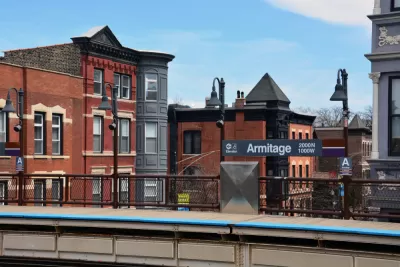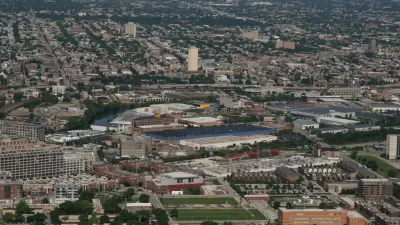The city is seeing a rapid loss of its signature two-, three-, and four-flat residential buildings, which historically served as affordable housing for working-class families.

"A report from the Institute for Housing Studies at DePaul University released Thursday shows Chicago has lost more than 4,800 two- to four-unit buildings since 2013, representing 11,775 rental and owner-occupied housing units," writes Hannah Alani in Block Club Chicago. But wealthy and poor neighborhoods are losing this housing stock "for starkly different reasons."
Across the city, 47.5 percent of demolished two-, three-, and four-flats "were replaced with a single-family home through conversion, or demolition and new construction, with the work being done mostly in North Side neighborhoods." But "about one-third of the city’s flats gave way to vacant land, with that happening mostly in South and West side neighborhoods dealing with disinvestment, long-term population loss and a foreclosure crisis."
Neighborhoods like Lincoln Park are quickly losing what was once "ample housing stock for working-class families," writes Alani. According to the DePaul research, "1,150 two- to four-unit buildings have been lost in lower-cost communities since 2013. Of those, 80.6 percent were converted to non-residential land uses. And of those, 89.1 percent are classified as vacant land."
To slow the conversion trend and preserve affordable multi-unit housing, city leaders are enacting ordinances that limit redevelopment or ban demolitions. "For example, the demolition ban along the Bloomingdale Trail prevents owners from tearing down two-flats and building single-family residences. An anti-deconversion ordinance in Pilsen aims to interrupt the loss of cheap housing stock in the gentrifying neighborhood. There’s also a new ordinance permitting a pilot program for Accessory Dwelling Units."

Alabama: Trump Terminates Settlements for Black Communities Harmed By Raw Sewage
Trump deemed the landmark civil rights agreement “illegal DEI and environmental justice policy.”

Study: Maui’s Plan to Convert Vacation Rentals to Long-Term Housing Could Cause Nearly $1 Billion Economic Loss
The plan would reduce visitor accommodation by 25% resulting in 1,900 jobs lost.

Planetizen Federal Action Tracker
A weekly monitor of how Trump’s orders and actions are impacting planners and planning in America.

Wind Energy on the Rise Despite Federal Policy Reversal
The Trump administration is revoking federal support for renewable energy, but demand for new projects continues unabated.

Passengers Flock to Caltrain After Electrification
The new electric trains are running faster and more reliably, leading to strong ridership growth on the Bay Area rail system.

Texas Churches Rally Behind ‘Yes in God’s Back Yard’ Legislation
Religious leaders want the state to reduce zoning regulations to streamline leasing church-owned land to housing developers.
Urban Design for Planners 1: Software Tools
This six-course series explores essential urban design concepts using open source software and equips planners with the tools they need to participate fully in the urban design process.
Planning for Universal Design
Learn the tools for implementing Universal Design in planning regulations.
Caltrans
Smith Gee Studio
Institute for Housing and Urban Development Studies (IHS)
City of Grandview
Harvard GSD Executive Education
Toledo-Lucas County Plan Commissions
Salt Lake City
NYU Wagner Graduate School of Public Service





























